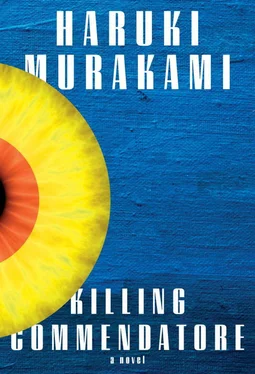“How long do you plan to be down there?”
“When I want to get out, I’ll ring the bell. When you hear the bell, take off the cover and lower down the ladder. If an hour passes without you hearing the bell, come and remove the cover. I don’t plan to be down here over an hour. Please don’t forget that I’m down here. If you did forget, I really would turn into a mummy.”
“The mummy hunter becomes a mummy.”
Menshiki laughed. “Exactly.”
“There’s no way I’ll forget. But are you sure it’s okay, doing that?”
“I’m curious. I’d like to try sitting for a while at the bottom of a dark pit. I’ll give you the flashlight. And you can hand me the bell.”
He climbed halfway up the ladder and held out the flashlight for me. I took it, and held out the bell. He took the bell and gave it a little shake. It rang out clearly.
“But if—just supposing—I were attacked by vicious hornets on the way and fell unconscious, or even died, then you might never be able to get out of here. You never know what’s going to happen in this world.”
“Curiosity always involves risk. You can’t satisfy your curiosity without accepting some risk. Curiosity didn’t just kill the cat.”
“I’ll be back in an hour,” I said.
“Watch out for the hornets,” Menshiki said.
“And you take care down there in the dark.”
Menshiki didn’t reply, and just looked up at me, as if trying to decipher some meaning in my expression as I gazed down at him. There was some kind of vagueness in his eyes, like he was straining to focus on my face, but couldn’t. It was an uncertain expression, not at all like him. Then, as if reconsidering things, he sat down on the ground and leaned against the curved stone wall. He looked up and raised his hand a little. All set , he was telling me. I yanked up the ladder, pulled the thick boards over so they completely covered up the hole, and set some heavy stones on top of that. A small amount of light might filter in through narrow cracks between the boards, though inside the hole should be dark enough. I thought about calling out to Menshiki from on top of the cover, but thought better of it. What he wanted was solitude and silence.
—
I went back home, boiled water, and made tea. I sat on the sofa and picked up where I’d left off in a book. I couldn’t focus on reading, though, since my ears were alert for the sound of the bell. Every five minutes I checked my watch, and imagined Menshiki, alone in the bottom of that dark hole. What an odd person, I thought. He uses his own money to hire a landscape contractor, who uses heavy equipment to move that pile of stones and open up the entrance to that hole. And now Menshiki was confined there, all by himself. Or rather, deliberately shut away in there at his own request.
Whatever, I thought. Whatever necessity or intentions motivated it (assuming there was some kind of necessity or intention), that was Menshiki’s problem, and I could leave it all up to him. I was an unthinking actor in someone else’s plan. I gave up reading the book, lay down on the sofa, closed my eyes, but of course didn’t fall asleep. This was no time to be sleeping.
An hour passed without the bell ringing. Or maybe I’d somehow missed the sound. Either way, it was time to get that cover off. I got up off the sofa, slipped on my shoes, and went outside and into the woods. I was a bit apprehensive that hornets or a wild boar might appear, but neither did. Just some tiny birds, Japanese white-eyes, flitted right past me. I walked through the woods and went around behind the shrine. I removed the heavy stones and took off just one of the boards.
“Mr. Menshiki!” I called out into the gap. But there was no response. What I could see of the hole from the gap was pitch dark, and I couldn’t make out his figure there.
“Mr. Menshiki!” I called again. But again no answer. I was getting worried. Maybe he’d vanished, like the mummy that should have been there had vanished. I knew it wasn’t logically possible, but still I was seriously concerned.
I quickly removed another board, and then another. Finally the sunlight reached to the bottom of the pit. And I could see Menshiki’s outline seated there.
“Mr. Menshiki, are you okay?” I asked, relieved.
He looked up, as if finally coming to, and gave a small nod. He covered his face with his hands, as if the light was too bright.
“I’m fine,” he answered quietly. “I’d just like to stay here for a little longer. It’ll take time for my eyes to adjust to the light.”
“It’s been exactly an hour. If you’d like to stay there longer I could put the cover on again.”
Menshiki shook his head. “No, this is enough. I’m okay now. I can’t stay any longer here. It might be too dangerous.”
“Too dangerous?”
“I’ll explain later,” Menshiki said. He stroked his face hard with both hands, as if rubbing something away from his skin.
—
Five minutes later he slowly got to his feet and clambered up the metal ladder I’d let down. Once again at ground level he brushed the dirt off his pants and looked up at the sky with narrowed eyes. The blue autumn sky was visible through the tree branches. For a long time he gazed lovingly at the sky. We lined up the boards and covered the hole as before, so no one would accidentally fall into it. Then we put the heavy stones on top. I memorized the position of the stones, so I’d know if anyone moved them. The ladder we left inside the pit.
“I didn’t hear the bell,” I said as we walked along.
Menshiki shook his head. “I didn’t shake it.”
That’s all he said, so I didn’t ask anything more.
We walked out of the woods and headed home. Menshiki took the lead as we walked and I followed behind. Without a word he put the flashlight back in the trunk of the Jaguar. We then sat down in the living room and drank hot coffee. Menshiki still hadn’t said a thing. He seemed preoccupied. Not that he wore a serious expression or anything, but his mind was clearly in a place far away. A place, no doubt, where only he was allowed to be. I didn’t bother him, and let him be. Just like Doctor Watson used to do with Sherlock Holmes.
During this time I mentally went over my schedule. That evening I had to drive down the mountain to teach my classes at the local arts-and-culture center near Odawara Station. I’d look over paintings students had done and give them advice. This was the day when I had back-to-back children’s and adults’ classes. This was just about the only opportunity I had to see and speak with living people. Without those classes I’d probably live like a hermit up here in the mountains, and if I went on living all alone, I’d likely start to lose my mind, just as Masahiko said.
Which is why I should have been thankful for the chance to come in contact with the real world. But truth be told, I found it hard to feel that way. The people I met in the classroom were less living beings than mere shadows crossing my path. I smiled at each one of them, called them by name, and critiqued their paintings. No, critique isn’t the right term. I just praised them. I’d find some good component to each painting—if there wasn’t, I’d make up something—and praise them for a job well done.
So I had a pretty good reputation as a teacher. According to the owner of the school, many of the students liked me. I hadn’t expected that. I’d never once thought I was suited to teaching. But I didn’t really care. It was all the same to me whether people liked me or didn’t. I just wanted things to go smoothly in the classroom, without any hitches, so I could repay Masahiko for his kindness.
I’m not saying every person felt like a shadow to me. I’d started seeing two of my students. And after starting a sexual relationship with me, the two women both dropped out of my art class. They must have found it awkward. And I did feel some responsibility for that.
Читать дальше











